What to Do If Acne Scars Are Still Red Years Later
- aliza khan
- Mar 19, 2025
- 3 min read
Acne scars can be frustrating, especially when they remain red long after breakouts have healed. While some scars fade naturally, others persist due to inflammation, vascular issues, or prolonged skin sensitivity. Understanding the causes and solutions is key to achieving an even-toned complexion. Those searching for the Acne Scar Treatment Clinic in Muscat can explore professional solutions designed to target stubborn redness and improve skin texture. A combination of skincare, lifestyle adjustments, and dermatological treatments can significantly reduce discoloration and restore confidence.
Why Are Acne Scars Still Red?
Red acne scars often result from lingering inflammation and dilated blood vessels in the affected areas. Unlike brown or indented scars, which involve pigmentation or tissue loss, red scars signal that the skin’s healing process is incomplete.
Post-inflammatory erythema (PIE): A common cause of redness, especially in lighter skin tones, due to damaged capillaries.
Chronic inflammation: Prolonged irritation can keep blood vessels enlarged, maintaining the red appearance.
Delayed healing: Poor skincare habits or excessive sun exposure may slow down the fading process.
Underlying skin conditions: Rosacea or sensitive skin can make redness more noticeable and persistent.

Effective Skincare to Reduce Redness:
A gentle yet targeted skincare routine can help soothe inflammation and accelerate healing.
1. Use a Mild Cleanser to Avoid Irritation:
Opt for sulfate-free, fragrance-free cleansers that won’t strip natural oils.
Look for green tea extract or centella asiatica, which calm inflamed skin.
Avoid hot water, as it can worsen redness by dilating blood vessels.
2. Apply Niacinamide to Strengthen Skin Barrier:
Reduces redness by improving skin resilience and calming inflammation.
Helps fade discoloration and supports overall skin tone balance.
Works well with hyaluronic acid for added hydration and soothing effects.
3. Incorporate Vitamin C for Faster Healing:
A powerful antioxidant that lightens red scars while protecting against UV damage.
Encourages collagen production, improving overall skin texture.
Should be used in the morning with sunscreen for best results.
4. Introduce Retinoids for Long-Term Repair:
Stimulate skin cell turnover, gradually reducing redness over time.
Help fade residual acne marks while preventing future breakouts.
Start with a low concentration to avoid irritation, especially on sensitive skin.
Professional Treatments for Stubborn Red Scars:
For those struggling with persistent redness, visiting an acne scar treatment clinic Muscat can provide advanced solutions that yield faster and more noticeable improvements.
1. Vascular Laser Therapy to Target Redness:
Pulsed dye laser (PDL) shrinks dilated blood vessels, reducing overall redness.
Intense pulsed light (IPL) treatments fade red scars while improving skin tone.
Minimal downtime, with results visible in a few sessions.
2. Microneedling to Promote Healing:
Tiny needles trigger collagen production, improving skin tone and reducing red marks.
Often paired with PRP (platelet-rich plasma) for enhanced repair.
Suitable for those with both red and indented scars.
3. Chemical Peels for Faster Skin Renewal:
Mild peels with lactic or mandelic acid gently exfoliate, promoting even-toned skin.
Stronger TCA peels can help deeper scars while addressing redness.
Works best in multiple sessions for gradual fading.
Lifestyle Adjustments to Prevent Red Scars from Lingering:
Daily habits significantly impact how long red acne scars last. Simple lifestyle changes can speed up healing and prevent further discoloration.
1. Always Wear Sunscreen to Prevent Darkening:
SPF 30+ with zinc oxide protects sensitive skin from worsening redness.
UV rays can prolong scar healing, making redness last longer.
Apply sunscreen every morning, even on cloudy days.
2. Reduce Inflammation with a Healthy Diet:
Increase intake of omega-3 fatty acids (found in salmon and walnuts) to reduce skin inflammation.
Eat antioxidant-rich foods like berries and spinach to support skin healing.
Avoid processed foods and high-sugar diets, which can trigger inflammation.
3. Avoid Harsh Treatments That Aggravate Redness:
Skip abrasive scrubs that damage the skin barrier.
Avoid alcohol-based toners and strong astringents.
Reduce excessive exfoliation, which can keep blood vessels inflamed.

How to Know When to Seek Professional Help:
If red scars persist for over a year despite proper care, it may be time to visit an acne scar treatment clinic Muscat for expert evaluation and treatment options.
Scars that remain red for years often indicate damaged capillaries that require targeted treatments.
If redness is accompanied by skin sensitivity, burning, or swelling, underlying skin conditions may be contributing.
Professional treatments provide faster, more effective solutions compared to at-home remedies alone.
Achieving Long-Term Clear and Even-Toned Skin:
Patience and consistency are key when dealing with long-lasting red scars. By combining a targeted skincare routine, lifestyle adjustments, and professional treatments, it’s possible to reduce redness and restore skin clarity. Seeking treatment at an acne scar treatment clinic Muscat ensures access to the latest technology and expert care, helping individuals achieve smoother, even-toned skin with long-lasting results.



Comments